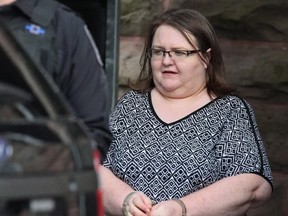Christopher Lyon does not say that criminally culpable homicide — murder or manslaughter — is occurring within Canada’s MAID system, ‘only that it could’
Article content
Canada’s assisted dying regime could provide a cover for medical staff with “serially homicidal personalities,” according to a controversial paper critics say provides no evidence patients could be preyed upon by criminal medical murderers.
“Canada’s MAID (medical assistance in dying) system is criticized as the most permissive or least safeguarded in the world, raising the question of whether it could protect patients who fit the clinical profile of adult victims of HSK (health-care serial killers) from a killer working as a MAID provider,” Christopher Lyon, a Canadian social scientist who teachers at the University of York in the United Kingdom, wrote in a newly published paper.
Advertisement 2
Article content
Insufficient vetting of staff, poor surveillance and oversight, and a failure by authorities to act on concerns raised by suspicious colleagues or witnesses have allowed health-care serial killers to go undetected for considerable periods, Lyon wrote in the journal HEC (HealthCare Ethics Committee) Forum, a partner journal of the American Society for Humanities and Bioethics.
Canada’s MAID regime “has similar features,” Lyon wrote, “with added opportunities for killing” afforded by broad Criminal Code exemptions from homicide and suicide offences “amid broad patient eligibility criteria.”
MAID’s oversight and delivery needs a “radical restructuring” to help mitigate the possibility of abuses, he said.
Lyon’s 77-year-old father died by MAID in 2021 in a Victoria hospital room, over the family’s objections that he had not been properly assessed. He’d had bouts of depression and suicidal thinking, but was approved for MAID nonetheless. In essays, Lyon has described his father’s MAID provider as “Death.”
Lyon does not say that criminally culpable homicide — murder or manslaughter — is occurring within the MAID system, “only that it could, and that Canada’s MAID regime may serve as a protectorate that allows serially homicidal personalities to ‘safely’ or legally kill.”
Advertisement 3
Article content
“I want to be clear: I’m not calling anybody out there a murderer or a serial killer in a culpable sense,” Lyon said in an interview. No police investigations or criminal charges are known.
Recommended from Editorial
Euthanasia “is fundamentally homicide by lethal injection,” he said. “Whatever one’s views are on MAID, it should be foremost in our minds that, at a basic level, we are empowering a privileged class of people to poison disabled and distressed people to death.
“A key reference point is health-care serial killers,” Lyon said. “Patient safety and ethical and rigorous medical practice demands that we be extremely careful about who we let do this, but I don’t see that happening in Canada.”
“Disabled people have been raising the risks of MAID being attractive to ‘angel of death’ characters for a very long time,” he added.
Vancouver Island family doctor and MAID practitioner Dr. Konia Trouton said she was “frankly, quite troubled,” by the suggestion Canada’s MAID systems could enable serial killers.
Article content
Advertisement 4
Article content
“The way (Lyon) writes this is that we could jump in and do this with an involuntary patient, and that certainly is not possible,” said Trouton, president of the Canadian Association of MAID Assessors and Providers and a clinical professor in the department of family medicine at the University of British Columbia. “It’s not legal. Everyone who does assessments and provisions for medical assistance in dying is aware that you’re risking your licence and you’re risking jail time if you get it wrong.”
With assisted dying, “the control does not rest with the clinician, ever,” Trouton said. “The control always, 100 per cent rests with the patient. We don’t even initiate the request unless the patient puts forward a verbal or written request to have an assessment for assisted dying.”
“We reiterate, many multiple times, that the patient can change their mind at any time, withdraw their request, say ‘no.’ There are multiple safeguards and steps in place that maintain the fact the patient is in control of the whole narrative, all the way through,” Trouton said.
University of Toronto bioethicist Kerry Bowman isn’t necessarily a flag-waver for MAID. “There are many things about medical assistance in dying that concern me,” he said. “This is not one of them.”
Advertisement 5
Article content
“I personally see a world of difference between a homicidal psychopath and someone that strongly believes in medical assistance in dying and may show poor judgment in terms of assessment,” said Bowman, who has been involved in multiple MAID cases and who consults on bioethics across the country.
To be eligible for MAID, a person has to be at least 18 and capable of making decisions about their health care. They must be independently assessed by two doctors or nurse practitioners, have a “serious and incurable” illness or disability and be in an advanced state of decline that is causing suffering that is intolerable to them.
“You have to be capable to request medical assistance in dying. You are dealing with teams of people — there are endless witnesses to everything that is done,” said Bowman. He has never heard of MAID being provided solely by a doctor or nurse practitioner working alone.
Bowman said he’s “endlessly seeing people involved in medical assistance in dying that are tying themselves in knots, saying, ‘Is there anything I’ve forgotten? Do you think I could have a blind spot? Do you think there’s any chance of bias?’”
Advertisement 6
Article content
In the past, victims of “nightmare” health-care serial killing horrors have almost always involved incapable patients, Bowman said — newborns or the elderly. Former Ontario long-term care nurse Elizabeth Wettlaufer killed eight care home residents via lethal injection, and tried to kill six more, before confessing to her nine-year killing spree.

Being capable means, does the patient understand and do they appreciate what they are seeking, Bowman said. “I don’t see medical assistance in dying as being this massive vulnerable population where people with homicidal intent could prey upon them,” he said. “I don’t see it.”
What he does see, “and where I think we need a lot more attention — and I’m not talking homicide here — is the fact that you can, and some clinicians do, bring (MAID) up with patients” before the patient raises it first.
In most jurisdictions in the world with legalized euthanasia, doctors are explicitly prohibited, or strongly discouraged, from raising assisted dying.
“If you bring this up, is it a muted recommendation? ‘Why are you bringing it up?’ We need more attention to the question of putting it out there as an option,” Bowman said.
Advertisement 7
Article content
Canada’s Criminal Code defines MAID as a “non-culpable” form of homicide that is not an offence, Lyon wrote. Culpable homicide is murder, manslaughter and infanticide.
While watching a documentary on Charles Cullen, a former American nurse imprisoned for murdering 29 elderly or seriously ill patients, Lyon said he was struck by how often statements Cullen made in his police interviews sounded “very similar to the things that I’ve read from MAID providers.”
In one study, Canadian MAID providers described the delivery of a medical death as “heartwarming,” “the most important medicine I do,” “an ultimate act of compassion,” “liberating,” like being on a “mission” and “almost an adrenaline rush. I was surprised at how good I felt.”
Lyon finds the language alarming. “In my view it should be a very sober and reluctant job.”
While studies have shown that the very old and very young are most likely to be victims of serial murderers, other victims had cognitive capacity, he said.
“One of the reasons health-care serial killers are often hard to detect is because they are so often not nightmarish,” Lyon added. “Some are even well-regarded by some of their colleagues, who defend them in disbelief.
Advertisement 8
Article content
“Like MAID providers, some health-care serial killers strongly believe they are helping and relieving suffering. MAID seems to provide the perfect legal cover for these personalities.”
There are multiple safeguards and steps in place that maintain the fact the patient is in control of the whole narrative, all the way through
Quebec’s commission on end-of-life care reported that, from 2021-2022, 15 deaths out of 3,663 were non-compliant with provincial or federal MAID laws.
“It appears that at least some providers are breaking the law,” Lyon said. “But because the MAID law is so permissive it’s hard to differentiate between someone who may be mistaken — but even then, would be a manslaughter case — to someone who is intentionally pushing the boundaries of the law or using the law maliciously.”
“We also know from research that at least some MAID assessors and providers avoid capacity assessments and rely on their own gut feelings,” Lyon said.
“I think when you are giving somebody a legally protected status that allows them to kill, we should ask hard questions about what happens to a person when they’re given that power, how they might use it, what that power might do to that person and who might be drawn to that power, and why.”
Advertisement 9
Article content
Pro-actively suggesting MAID, as medical staff have been encouraged by guidance from MAID leaders to do, “gives somebody who is enjoying this the licence to seek new opportunities to do this,” Lyon said. “If you believe very strongly in it, or you’ve been given the power to do this, some people might take advantage of that.”
A Wettlaufer personality “might operate undetected as a MAID provider, either by killing only MAID-eligible patients for personal benefit or misguided altruism,” he said.
Canada lacks an oversight system to independently review MAID requests and “determining what, where and how deaths are reported varies between jurisdictions,” Lyon wrote.
“I think we need far better oversight,” he said. “I think it needs to happen at a national level. It should be standardized and transparent — transparency around providers, their numbers, the kinds of patients they administer to and how the assessments were done.”
There should also be a “standardized script” for presenting MAID to patients, he said.
“So, you can’t say that death is ‘beautiful,’ or ‘elegant.’ You have to present how the person dies by MAID, the risks involved, what is known and not known about it so that you can’t impose your subjective views on it.”
Advertisement 10
Article content
Trouton said MAID assessors and providers must document “the lack of coercion — that there is no coercion by the family, by clinicians, by friends, by anyone else.
“We ask how did the patient hear about MAID, how did they explore MAID, where did they come about it?” The two independent assessors “must independently, from separate times at separate places, come to the conclusion that the patient has met the criteria, if they both believe that,” she said.
“The patient must be a competent patient, able to make that medical decision, able to rationalize between choices and must be in control of making the request for MAID at all stages.”
Doctors and nurse practitioners are keenly aware that they’re working in a “narrow little limited scope of an exemption” from the Criminal Code, Trouton said.
National Post
Our website is the place for the latest breaking news, exclusive scoops, longreads and provocative commentary. Please bookmark nationalpost.com and sign up for our daily newsletter, Posted, here.
Article content









